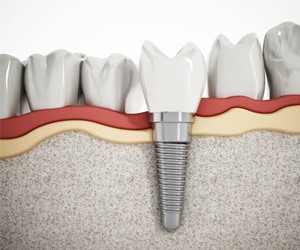

Dental implants are considered the pinnacle of tooth replacement solutions, as they’re able to rebuild missing teeth from the roots up. While they often boast a success rate of more than 95%, even 10 years after placement, there’s still an incredibly small chance that they can fail. This can be due to several reasons, so it’s important to know the signs to watch out for in case you notice any issues with your new pearly whites. If you detect any indications that something is wrong, our team can offer dental implant salvage treatment to help save one that’s failed or potentially failing. Read on to learn more or call us to schedule an appointment today!

The biggest culprit of dental implant failure is usually peri-implantitis. This is a kind of gum infection that targets the area and connective tissues around the metal post which starts to weaken and destroy its stability and foundation. If left unchecked, the jawbone can begin to deteriorate, eliminating the support your dental implant needs to effectively restore your bite.
This complication can often happen due to poor oral hygiene, as bacteria can collect around the gums and metal post(s). However, implant failure can also occur due to things like physical injury/trauma, failed osseointegration, or a medical condition that keeps the body from reliably supporting the dental implant(s).

Some of the most common signs that a dental implant has failed include:

If you’re concerned that your dental implants might be at risk of failure, our team can offer salvage treatment to address your situation. This typically involves an evaluation of your oral health and restorations, reviewing your symptoms, and determining the proper plan for preserving your results. This could mean we’ll need to perform gum disease treatment, bone grafting, antibiotics, or some other method for controlling infection. The earlier we’re able to treat your situation, the higher the chance of regaining the full function of your dental implant(s)!